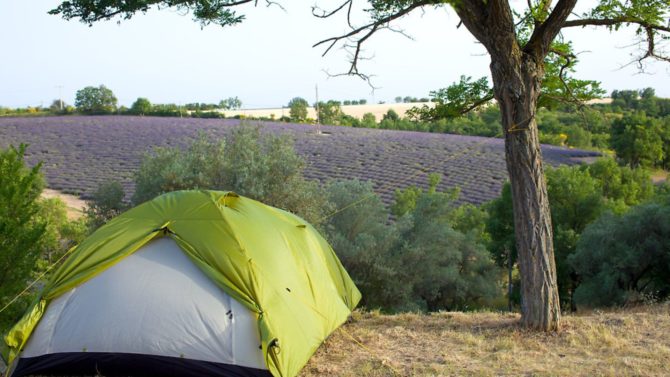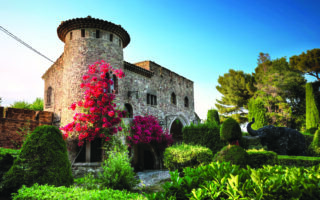Guide to setting up a campsite in France

Running a campsite in France can be hard work but offers a decent income and a rewarding lifestyle. Make sure you carefully consider the location, regulations and costs before you invest in a campsite

France is a camping paradise. The country has just under 9,500 sites (this includes official campsites and registered ‘natural camping’ areas), offering accommodation for over three million people on some 922,000 pitches. In fact, it is the top country in Europe for camping and second worldwide after the United States. The French themselves made up the largest proportion of campsite guests in 2016, accounting for 68% of bookings. They choose to spend their summer holidays camping because of its affordability, community spirit and entertainment on offer. They are fiercely loyal to their campsites, returning year after year to the same one, sometimes even the same pitch.
Make sure you choose the right location
Think of the holiday experience you’d like to provide and the type of campsite you would want to run. Logistics, maintenance and even your clientele will obviously be different on a seaside or a mountain campsite, for example. Also remember that your working season will last longer in the south. Campsites that do well in the summer are generally located on the coast. Places like Normandy or the Atlantic coast also attract people who stay for longer periods of time, sometimes even permanent residents in mobile homes. Campsites on the outskirts of towns and cities, meanwhile, can often do well year round.
A scenic location is key but think also of space per plot and shade. Ease of access and proximity to entertainment, shops, restaurants and things to do are important, unless you want to offer a back-to-nature experience. Study weather reports from previous years and research your competition. Is there a gap in the market? What will you provide that’s different from the campsites around you? Make sure the land you are looking at is not in a flood-risk zone and always check planning regulations with local authorities before starting your project.
_______________________________________________________________________________
Don’t miss

Guide to setting up a business in France
Buying an existing business in France
_______________________________________________________________________________
Decide what type of campsite you want to run
Think about how many pitches you want to manage and how big a site you want to run. On average, French campsites have 111 pitches, according to the Fédération Française des Campeurs, Caravaniers et Camping-Caristes. There are two types of campsites in France: a camping declaré, which offers up to six pitches for a maximum of 20 people, and a camping aménagé which will offer more than six pitches.
Understand the regulations
The camping déclaré requires a simple declaration to the mairie. You would need to provide drinking water, and shower and toilet facilities at the very least. Some people run small campsites from their farm, for example, known as camping à la ferme. The local urban plan may stipulate certain conditions that could lead to your project being refused so it is best to check with local authorities before you start.
Campings aménagés require a little more organisation. You’ll need to apply for a permis d’aménagement which, if successful, will set out the number of tent, caravan and mobile home pitches you can have, the site layout and the facilities you must provide. The permit is valid for three years. You’ll also have to request a certificat de conformité des travaux once any work has been completed to ensure it complies with the local urban plan. It has to be filled in by a qualified professional such as a specialised architect or a registered diagnostiqueur. You’ll also need to consider access and your impact on the environment (especially water treatment).
If you’re running a camping aménagé you will also have to decide on the status you will operate under. This is quite complicated as it varies according to how long your guests stay. A camping mention tourisme allows a stay of under a month while a camping mention loisir allows for longer stays. If you choose a camping saisonnier (seasonal campsite) then you can only open for two months a year with a maximum of 120 pitches on a one and a half hectare plot of land.
Much like hotels, there is a star system – one to five – which determines criteria such as the number of pitches you can have per hectare. Both the Fédération Française des Campeurs, Caravaniers et Camping-Caristes and the Fédération Nationale de l’Hotellerie de Plein Air have comprehensive websites and you can always seek help at the local mairie.
_______________________________________________________________________________
Don’t miss
Running a luxury camping business in Charente
Different ways to make money from your French property
_______________________________________________________________________________
Start small
If you want to create your own site, start with a small camping déclaré on your property’s land advises Sébastien Cantais, whose agency Campings à Vendre has been selling campsites for 23 years. This allows you to get a feel for the activity and keep the workload manageable. “It is increasingly complicated and very expensive to create a big campsite from scratch these days,” Sébastien explains. “Mobile home pitches and a pool are mandatory nowadays so the investment is huge.
Offer something unique
“But, with the rise of ‘gamping’ where people let travellers camp in their garden, it is a very interesting time to offer something different, exciting and original on a smaller, more intimate scale.” In fact, Sébastien notes that many international buyers are purchasing properties with land to create a small campsite yet offering a very high-quality service. Glamping and camping insolite – with unusual outdoor accommodation such as yurts, tepees or ‘bubble rooms’ – are increasingly popular and so, you could surf that wave before expanding into a fully fledged campsite. “The investment is not as huge but you can still offer a proper service to travellers,” says Sébastien.
Consider taking over an existing business instead of starting from scratch
The advantage of taking over an established campsite is that everything is already in place, from facilities to registration, and you simply need to take over the reins. Taking on an existing campsite means you will inherit its reputation and, hopefully, its loyal clientele. Once you’ve settled in, it’s a good idea to send out a newsletter to those faithful clients to introduce yourself and ask if there is anything they’d like to change or keep. There are a few things you need to be aware of, however. Firstly, ask the seller for detailed records of turnover, bookings etc so that you can get an idea of what you are looking at, says Yvonne Drolshagen. “Make sure a chartered accountant gives you a complete study of all the latest takings, precise figures and occupancy rates,” she explains. You must also ensure all the norms and regulations are respected and up to date to avoid any costly surprises once the keys are handed over.
Be prepared for a large initial investment
Buying a business will usually be more expensive than purchasing a residential property. Sébastien, whose website has nearly 250 campsites for sale, estimates that you’d need at least €250,000-€300,000 to buy a campsite. “It’s a big first step to take, but the property is also your work tool so it’s an investment that pays off,” he says. A campsite can certainly be profitable provided you put in the hard work while others enjoy their holiday. The return on investment can be impressive – “about 50% profit” says Sébastien – though this is likely to be limited to the summer months.
Market your campsite widely
An easy trap to fall into is to market your campsite to only British tourists as you most certainly won’t get enough visitors. The Dutch, in particular, are fans of camping in France.
Like this? You might enjoy:
Family-friendly campsites in France
Share to: Facebook Twitter LinkedIn Email


